Archive for February, 2023
Writing my masters thesis in Linz
- Simulation Sciences M.Sc
- Austria, Linz
- Institut für Verfahrenstechnik, JKU Linz
- 05/2022 – 09/2022
For my masters in Simulation Sciences with specialization in Fluid Process Engineering I searched for a masters thesis solely based on who did the most interesting topics. My attention fell on the habilitation thesis of a researcher in Linz who was actually quite happy to hear of my interest in his research – which made it quite easy to actually get the thesis. It should only be pointed out that for an external thesis usually an internal supervisor in the sending institution should be found first – a step I quite resolutely forgot. After I was luckily able to find an internal supervisor as well, accommodation in Linz was secured via WG-Gesucht, a portal to find flat-shares. Here it must be noted for later interns that a detailed and well written motivational text with your introduction, your advantages as flatshare-partner (many) and your expectations from your room-mates and flat-life (basics like “communicative” and “having a shared interest in keeping everything clean”) is key. If you mention something that fits only to their advertisement and no other, it is in all likelihood an additional big bonus.
After arriving in Austria and starting my internship, it was a positive surprise that not too many organizational hurdles had to be overcome, thanks to the unbureaucratic university and institute in Linz. Furthermore, I profited greatly from EU standardization, thanks to which my bank account and and SIM card worked fine. Future interns may find it useful to know that after shopping for groceries most supermarkets will hand out cash from your personal bank account when asked, so that the usual service fee at foreign ATMs can be completely avoided.
The actual work during my time in Linz itself was pretty independent. I’ve got my project and my supervisor was available for questions, if needed. The institute was very small such that everyone got to know everyone well and regularly had lunch together, which I kept in good memory. Otherwise it didn’t differ significantly from any student thesis back at my university. However, it should be noted that for an external thesis with internal supervision back at your home university regular meetings with your internal supervisors are recommendable in order to avoid confusion between your different supervisors. For me one meeting roughly every three weeks worked fine.
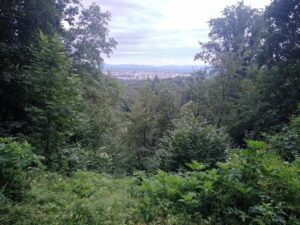
© Simon Stark
The most essential part next to work was of course to get to know Linz in special and Austria in general. As the cultural and linguistic ties between Austria and my home country Germany are relatively close, I halfway expected to avoid a culture shock once I adapted to the local dialect. But once the beer was sweet, the bread contained cumin and the sausages were actually better than in Germany, it definitely hit me. Next to the food side of things, the Austrian culture I’ve got to experience stood out by an avid “outdoors-culture” – which I thoroughly enjoyed – and the attitude to rather overspend on the good things on life than to end up with something bad – which I only got to enjoy once the Erasmus+ grant was approved.
Besides of things that appeared as distinctly Austrian to me, the city of Linz offers a pretty old town with a castle directly next to the Danube river and a rich cultural scene containing the Ars Electronica fair and two universities for arts. For parties on the other hand one didn’t even need to leave the university campus, as the students and faculties regularly organize faculty parties for their specific field of study or mensa-parties in the university canteen rooms for everyone. For me however, the most memorable activities were the hikes in the hills north of Linz, which is why I close this report with an image from there, with the city in the background.
My practical year in St. Johann in Tirol, Austria
- Medicine
- Austria, St. Johann in Tirol
- Bezirkskrankenhaus St. Johann in Tirol, department of “Allgemein- und Viszeralchirurgie”
- 11/2022 – 01/2023
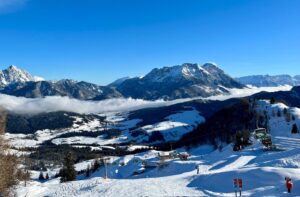
© Angela Kurz
Preparation
I applied around ten months before the start of the Practical Year (called Praktisches Jahr (PJ) in Germany or Klinisch Praktisches Jahr (KPJ) in Austria). However, most places at the hospital “Bezirkskrankenhaus St. Johann in Tirol” are already taken one and a half to two years in advance, so it makes sense to call first and ask if there are still places available. The contact person is the “Sekretariat Ärztliche Direktion”, whose contact details can be found on the hospital’s website. They will also tell you which documents you need for the application. The hospital is a teaching hospital of the Universities of Innsbruck and Vienna. I would recommend contacting Ms. Lemos, the coordinator for study abroad of the medical faculty of the RWTH Aachen University, in time for necessary formalities.
Accommodation
There is a house right next to the hospital where students who are interns at the hospital can stay for free. Each student has their own room and bathroom. The kitchen is shared and is a great meeting place for communal meals and game nights. You also get free breakfast, lunch, and dinner from the hospital. However, the number of rooms is limited, so you should register for this in time. Since there wasn’t a room available at first, I lived in an apartment in the neighbouring town for the first two weeks. Then I was able to move into the student house for the remaining time. I would recommend checking regularly with the secretary’s office, as there are often vacancies in the house at short notice. I found support in finding a private apartment at the secretary of the hospital and the tourism association (Tourismusverband St. Johann in Tirol), each of which sent me a list of contact details of private landlords via e-mail.
Traineeship
On the first day of my internship, I had some organisational tasks to do: I reported to the secretary’s office, received work clothes, a staff ID card, and keys. Then I introduced myself to the surgical department. The working day began daily at 7.15 a.m. with the morning meeting. Afterwards, we medical students took some blood samples on the ward or assisted in the operating theatre. The rest of the time we accompanied the doctors in the surgical outpatient department. The day ended around 4 pm after the X-ray discussion and the ward rounds – on Fridays, usually a little earlier. As a medical student at the hospital in St. Johann, you do two night shifts a month, one during the week from 4 pm until the next morning and one on the weekend. The tasks include taking blood samples, setting up intravenous lines and assisting in the operating theatre if necessary or helping in the emergency room. I would recommend rotating also to orthopaedics/trauma surgery as part of the surgical tertial if possible.
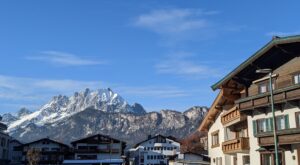
© Angela Kurz
Free time
The region around St. Johann in Tirol is situated in the middle of the mountains and offers many great leisure opportunities. There are many ski resorts nearby, e.g. St. Johann itself, Kitzbühel, Saalbach/Hinterglemm or Ellmau/Scheffau. In some of them you even get a discount with your employee ID card! In other seasons, of course, there are also wonderful hikes to be done. The cities of Kitzbühel, Innsbruck and Salzburg are also not far away. In December, the Kitzbühel Christmas Market is definitely worth a visit!
Conclusion
I really enjoyed my time in St. Johann in Tirol and can recommend a PJ tertial in this great area. I made many new friends, and we made great memories together in the hospital and during our weekends in the mountains.
Getting to know a different culture
- Mechanical Engineering B.Sc.
- France, Signy L’Abbaye
- Beuret Sarl
- 09/22 – 12/22
My internship in France
The company I worked for produces agricultural equipment and steel structures for buildings. Since the company moved to a new location recently, they needed new custom equipment like tool cart for storing and moving heavy tools. I spent the majority of my time developing, designing in the office and manufacturing this equipment in the factory. Having the responsibility for those projects and completing them was a truly rewarding experience.
Even though I did not work on the division of the company that was responsible for the buildings they let me go on the respective construction sites a few times during my stay. Although this was not at all part of my internship, I still enjoyed discovering the big machines and assembly techniques they used to join the massive components that were previously prepared in the factory.
Working in a small company (about 10 persons in total) helped me to get to know all the people very quickly. I had a great relationship with both the employees and the supervisors from the beginning on which made my time in the company really enjoyable.
I worked a total of 40 hours a week which is not necessarily typical in France. Many people only work 35 hours. This makes room for other activities after work. Also, the meals have a much greater importance than in other European countries. Lots of companies have 60 to 90-minute lunch breaks and it is common for grocery stores and other shops to close during midday. But many stores make up for this by opening their doors on Sunday morning.
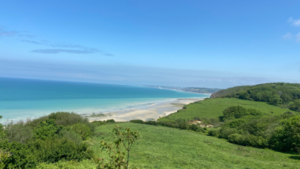
© Dimitri Robert
Luckily, on Fridays I only worked till 12 pm which made it possible to plan longer activities for the weekend. I tried to discover as much as possible of the “Champagne” region. It’s especially known for its production of champagne and its vineyards.
On another occasion I had the opportunity to travel to the beaches of the Normandy and admire the breath-taking landscape. These places are not only beautiful but also have an undeniably interesting historic relevance.
Travelling to these different destinations by train is difficult and takes a lot of time. In addition, the company I worked for was situated in a very rural area. So, having a car was a necessity in this region of the country.
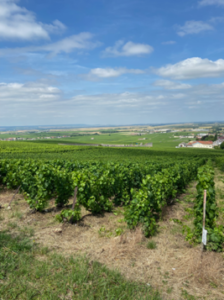
© Dimitri Robert
Something you need to get used to when you live in France are long and late dinners. Most of the time, they start with the well-known “apéro” where you have a few drinks and snacks before beginning to eat your meal. I really enjoyed those convivial evenings. I also observed that drinking wine at dinner was a lot more common than in Germany. Even a lot of young people enjoy drinking a glass of wine instead of beer. In general, the locals are proud of their local wine and especially champagne.
Helpful information
Good news is my phone worked without any issue thanks to EU-Roaming. On the other hand, German mobile network operators have put in place a limit of months that you can spend abroad. Exceeding this time limit will result in them charging you extra roaming fees. Luckily, many French carriers provide very generous offers for the first year of contract. Combined with a pricing that is generally much lower than in Germany, getting a mobile plan with a lot or even unlimited data becomes very affordable. Your mobile plan can even replace Wi-Fi. So, if you plan on staying more than a few months in France, I would definitely recommend getting a French mobile plan.
Same thing goes for your bank account and credit card. You should check with your bank if the card you plan on using works abroad. Opening a bank account was not necessary for me but it made withdrawing money free of charge and receiving my salary was also easier this way.
Keeping in mind that finding a fitting internship and going through the application process would take a bit longer than in my home country, I started to plan my stay more than 6 months ahead. This gave me enough time to prepare everything properly and I would recommend this to anyone who wants to go abroad. All in all, my internship abroad was a great experience for me. Getting to know a different culture and improving my language skills while completing a mandatory part of my curriculum was amazing and I would recommend it to anyone who has the opportunity to do so.

